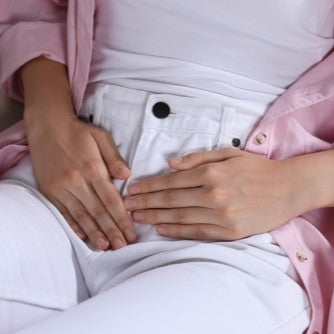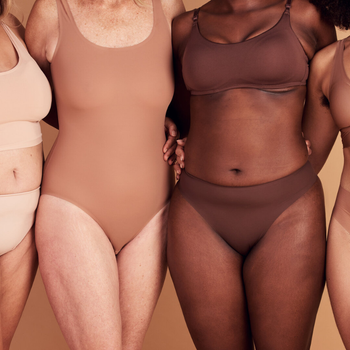Hot flashes lend a sort of mythical aspect to menopause. They're talked about in pop culture and the media often with humor. Societal norms leave many to whisper about unexpected heatwaves. Hot flashes usually pop up around perimenopause, or the first early phase of menopause, and can linger into the postmenopausal years. There’s a myriad of all-natural supplements for hot flashes and night sweats. Interestingly, clinical studies show that any hot flash supplement helps a tiny bit, thanks to the placebo effect. Let’s dig into holistic support for hot flashes and answer the question of the hours: Does vitamin E really help with hot flashes?
Understand the Cause of Menopause
In this article, when we say menopause, we are actually referring to the menopausal transition era. The menopausal transition encompasses all three stages of menopause. Perimenopause is the first stage of menopause, with an onset around age 47 and lasts an average of four years. Menopause is actually only the time when a woman has now menstruated for 12 consecutive months. Postmenopause is the phase following those 12 months when a woman no longer gets her period. The postmenopause phase can last four to ten years.
Menopause is caused by a change in sex hormones in the body. Translation: As you evolve in age, your body begins to naturally produce less estrogen. Estrogen is a key sex hormone in the female body. With less estrogen comes some menopausal symptoms. For example, as your estrogen levels decrease, you begin to experience hot flashes. This is because decreased levels of estrogen trigger your hypothalamus (which regulates your body's temperature) to become more sensitive to slight changes in body temperature. Even a difference of a couple degrees can send your body into overdrive as it attempts to cool you down, resulting in a hot flash. Hot flashes can also occur when your progesterone levels are particularly low. It is worth noting that menopause isn't the only reason people experience hot flashes. Breast cancer survivors are also more susceptible to hot flashes, due to the decreased amounts of estrogen in their body after receiving treatment.
A night sweat is a hot flash that occurs while you sleep. Imagine how your body's temperature fluctuates naturally while you sleep - as your central air flickers on and off and you ease in and out of the covers, it is only natural that your body's temperature will change. However, this means your hypothalamus steps in to save the day and instead triggers a hot flash that jolts you from your sleep. Yikes. It is natural to experience both night sweats and hot flashes from perimenopause all the way through postmenopause. If you're looking for simple relief to hot flashes and night sweats, try our Cool Down Mist, formulated with omega-rich extracts to nourish, hyaluronic acid to hydrate, and with our InstaCalm-3 Complex - a blend of three clinically-studied ingredients shown to provide an immediate skin-cooling sensation and help reduce the intensity of hot flashes and night sweats.
The Effect of Vitamin E on Hot Flashes
Okay, finally, the info you've been waiting for. Does Vitamin E help hot flashes? Absolutely! Clinical studies conducted by the National Institute of Health (NIH) have shown that vitamin E can significantly ease the discomfort that comes with hot flashes. Vitamin E is a powerful antioxidant that can support women through the menopausal transition with a variety of menopausal symptoms. It decreases inflammation in the body and helps fight cell-damaging free radicals. Not only does it help with decreasing the occurrence of hot flashes, it also can decrease your likelihood of experiencing depression, heart disease, oxidative stress, and weight gain, all of which are issues that can be common in menopausal evolution. Vitamin E has also been shown to help with stress management, another plus since stress is cited as one of the most common symptoms of menopause. For best results, aim for at least 15 mg of Vitamin E daily. You can take it as a supplement (the supplement form of Vitamin E is often referred to as d-alpha-tocopherol) or simply access it through your regular diet. Foods rich in Vitamin E include wheat germ, almonds, broccoli, hazelnuts, avocado, shellfish, squash, sunflower seeds, and spinach. Integrating these ingredients into daily meals will serve you well!
Move Over Vitamin E - Vitamin D is Here to Help
Vitamin D is another dietary friend to your menopausal evolution. During menopause, lower levels of estrogen can lead to a loss of bone density. Loss of bone density can lead to osteoporosis, bone pain, and fragile bones that break easily. Vitamin D can decrease your risk of bone fractures and bone pain while increasing your overall bone health. It also reduces the risk of cardiovascular disease. Women ages 50 and under should get at least 15 mg of Vitamin D daily. Women over the age of 50 should have at least 20 mg of Vitamin D daily. It is recommended to take Vitamin D as a supplement, to ensure you absorb all of its nourishing benefits. That being said, it doesn't hurt to add foods rich in Vitamin D to your diet. Cheese, egg yolks, and fatty fish are all great sources of Vitamin D. Add in some calcium for good measure and your bone health should be in prime shape. Be sure to chat with your women's health provider before running out to purchase a Vitamin D supplement, as high doses can affect blood pressure.
How to Manage Hot Flashes with Complementary and Alternative Medicine
We want to empower you with the most knowledge possible regarding effective treatments for the menopausal transition. Depending on your severity of hot flashes, a physician may recommend hormone replacement therapy (HRT). Hormone therapy isn't an option for everyone and has been linked to an increased risk of breast cancer. Your doctor might also recommend non-hormonal treatments like gabapentin. Gabapentin can have pretty intense side effects and again, may not be an option for everyone.
Black cohosh is a non-hormonal, over-the-counter supplement that many turn to for hot flash support. The side effects of black cohosh can be rather intimidating. Headache, rash, weight gain, vaginal bleeding, and cramping are some of the heavy hitters that accompany black cohosh. If that sounds too intense, there’s no shame in crossing it off your personal list of support options. Red clover is another supplement that is available over-the-counter - however it shares many of the same side effects, so tread with caution. Dong quai is also a common supplement folks turn to when experiencing hot flashes. There are conflicting studies on the efficacy of dong quai, with some stating great success in clinical trials while others note no difference. Isoflavones are yet another supplement that may be recommended for treating hot flashes - however, they can affect thyroid function, thus discounting it as a viable option for everyone.
There’s a lot to consider when it comes to finding relief for menopause symptoms. Take the stress away with Kindra’s MenoRelief Supplement, which offers all the efficacy with none of the scary side effects. Our MenoRelief Supplement is our signature all-in-one support blend designed to tackle the eleven most common symptoms of menopause: stress, fatigue, brain fog, night sweats, hot flashes, mood changes, and disrupted sleeping. MenoRelief features Pycnogenol an antioxidant-based plant with high levels of Vitamin C. Our clinical trials prove significant relief after just 60 days of regular use. If you find that night sweats and sleep disturbances are impacting your quality of life more than ever, our MenoRelief Supplement may be your next go-to.
MenoRelief
Some key lifestyle changes that may be effective in curbing the onset of hot flashes. First, you may want to menopause-proof your wardrobe. Natural fibers like cotton, silk, and linen tend to keep the body cool, helping you out whenever a heat wave comes on.
A holistic treatment supports the whole person. Aside from hot flashes, you may also experience vaginal dryness. Vaginal dryness can cause discomfort, disruption to your sex life, and even painful vaginal bleeding. Our Daily V Lotion is filled with nourishing humectants, plant-based oils, and lots of Vitamin E, further proving this vitamin's versatility from oral supplement to topical solution. If you're finding mood swings are disrupting your daily life and over-the-counter supplements are offering no relief, consider reaching out to your healthcare expert for more support. Psychotherapy, mindfulness, and even antidepressants can all be viable treatment options for you.
Our Promise to You
Menopause-related health concerns are not always easy, but you're never alone. We believe community is key especially during something as life changing as a menopausal transition. We created a Facebook group for women to come together and find support during this time. Please join us!
Continue the Conversation
Leave a Reply
Tags: About Menopause Anxious body Dry Skin Fatigue Foggy & Unfocused Hot flashes Mental Well-Being Moody & Irritable Night Sweats Painful Sex Physical Well-Being Sad Stressed Vaginal Dryness















LOVE these sources. This is sooo helpful
— Kelly T
super interesting. thank you for sharing! :)
— Teresa
Thank you this info is extremely helpful.
— Lenora C